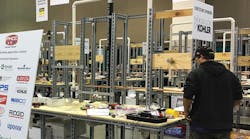Latest from Training
Sponsored
Who doesn’t know what a plumber does? Apparently, a lot of people, including the young people the industry is trying to recruit and members of Congress. Plumbing-Heating-Cooling Contractors – National Association and its chapters are working to change that.
Previously the federal government was sending the message that a four-year college education was the only path to a middle-class lifestyle, said Cindy Sheridan, COO of the PHCC Education Foundation. Now just about every industry that requires a trained workforce is lobbying Congress.
Congress has become increasingly aware of the need for career and technical education, said Mark Riso, PHCC’s vice president of legislative affairs, “but they don’t know how to put their arms around it.”
There are positive, concrete steps being taken. Congress passed a true reauthorization of the Carl D. Perkins Career and Technical Education Act with a modest increase in funding. The Congressional Career & Technical Education Caucus in the House of Representatives has grown to more than 100 members, Riso said, and the caucus on the Senate side now has 27-28 members.
Riso believes that once the tax bill is out of the way, Congress will come back after the Christmas recess and tackle infrastructure. The problem is that there aren’t enough workers to perform the work, which will force a focus on CTE.
Solid local work
Sheridan called out the good work that’s being performed at the local level. The Tennessee chapter started the Ride & Decide program that puts a young prospect in a truck with a young service technician to see what the job is really about. Ride & Decide has been adopted by chapters from California to Georgia. Kevin Kruse, the executive director of PHCC of Iowa, along with other Iowa construction associations, sponsored an event in Des Moines with Mike Rowe that drew 1,500 people. In Clarksville, Tennessee, Hiller Plumbing, Heating, Cooling & Electrical created a program with the Army at Fort Campbell, Kentucky, called Transition to Trades that trains soldiers transitioning out of the military to work in the trades. Susan Frew, co-owner and president of Sunshine Plumbing, Heating & Air, Henderson, Colorado, gave a TEDx talk on how part of the solution to the industry’s workforce problems is to get more women into service technician jobs.
Contractors are urged to bring their younger techs or apprentices into the classroom because they can talk about the rewards of the industry in a way that resonates with high school students.
Sheridan noted that the PHCC Education Foundation partners with state chapters in creating online training and has a dozen state chapters that now offer online apprenticeship training. Online training can be approved by state apprenticeship committees for remote areas where it can be a challenge to travel to a physical classroom.
One-stop shop for info
Indiana contractors decided to become a one-stop-shop for clear and consistent information on plumbing careers, said Brenda Dant, executive director, PHCC of Indiana.
The chapter created a website, thebestcareer4you.com, designed to walk 18-24-year-olds through bullets points about a plumbing career, links to other resources, and can connect the young person with a PHCC contractor in his or her county who will contact them and answer questions and talk about the industry.
The website lists three key points. First, you earn while you learn with no student debt. Second, the pay is great. A new plumber makes more money than a new liberal arts graduate and average pay in Indiana for an experienced plumber is nearly $54,000. Third, plumbers are in high demand so you’ll have job security in an occupation that can’t be outsourced.
The amount of education that’s required is surprising. Students literally don’t know what a plumber does. Students don’t read email so Indiana PHCC collects their cell phone numbers and texts them with short bursts of information. This past year, the association has spoken at 48 schools and training programs in front of 5,100 students, most of them in high school.
The students don’t understand things that the industry takes for granted — such as plumbing is a great career and you can make a lot of money. Dant said they ask the students what they think is “good money,” and then tells them that they can top that. They don’t understand how smart you need to be to be a plumber. They don’t understand where clean water comes from.
Dant said she’s talked to students who’ve returned from a mission trip where they dug wells and installed pumps to provide drinking water to a village, but they never thought about the connection to plumbing in Indiana.
The concept of a career doesn’t mean a whole lot to a high school student, Dant said. They want to work in a job that they like until they don’t and then find another job that they like. A successful tactic is to point out that a trained plumber can go in multiple directions, working for a manufacturer or a wholesaler, for example, doing things like sales or software development.
Contractors are urged to bring their younger techs or apprentices into the classroom because they can talk about the rewards of the industry in a way that resonates with high school students.
Dant has also noticed that contractors who would not have ordinarily been active in the association get involved in workforce development efforts because their future depends on it.
“All of the people that we talk to go away smarter than when we walked into the room,” Dant said.
School by school
Texas PHCC is making strides school district by school district and school by school, said Executive Director Alicia Dover.
High schools are starting workforce readiness programs, including construction tracks. “This is a huge shift for Texas to accept that not everybody is college bound,” Dover said.
High schools are creating generalized “umbrella” programs that teach students a little carpentry, a little electrical, some plumbing and air conditioning, blueprint reading and welding. PHCC realizes that’s a good start and they can’t insist on a specialized plumbing curriculum. The construction program can be either a two- or three-year program.
In a significant advance, the Texas legislature passed a bill that says if a student graduates high school with a construction-related certificate, then State of Texas licensing agencies for each trade will recognize 250 hours toward the student’s first license. After a year of training — 2,000 hours — an apprentice can add drain cleaning and residential utility installer to his apprentice registration. After 4,000 hours of training, or two years, the apprentice can add a “tradesman” license that allows them to do residential work. After four years the plumber can get a journeyman’s license allows him to perform either residential or commercial work, and then a Master’s License.
Several high school districts are starting standalone construction programs, Dover related. Construction programs can be on the same campus as a high school, but in Waco it’s in a separate building and students come in from various school districts. Lubbock is doing the same thing. San Antonio has a construction academy located on the campus of a high school. A second San Antonio high school district has passed a bond issue to refurbish old buildings into a standalone construction academy. A Houston district is creating a construction academy and a suburb of Dallas is considering it.
“It has only just begun,” Dover said, “and with each step forward we’re seeing more that needs to be done. What we’ve accomplished to date is awareness — people know. Now we have to put money where our mouth is because people are looking to us for answers.”
Robert P. Mader
Bob Mader is the Editorial Director for Penton's mechanical systems brands, including CONTRACTOR magazine, Contracting Business and HPAC Engineering, all of which are part of Penton’s Energy and Buildings Group. He has been with CONTRACTOR since 1984 and with Penton since 2001. His passions are helping contractors improve their businesses, saving energy and the issue of safeguarding our drinking water. He is a graduate of the University of Notre Dame with an A.B. in American Studies with a Communications Concentration.


